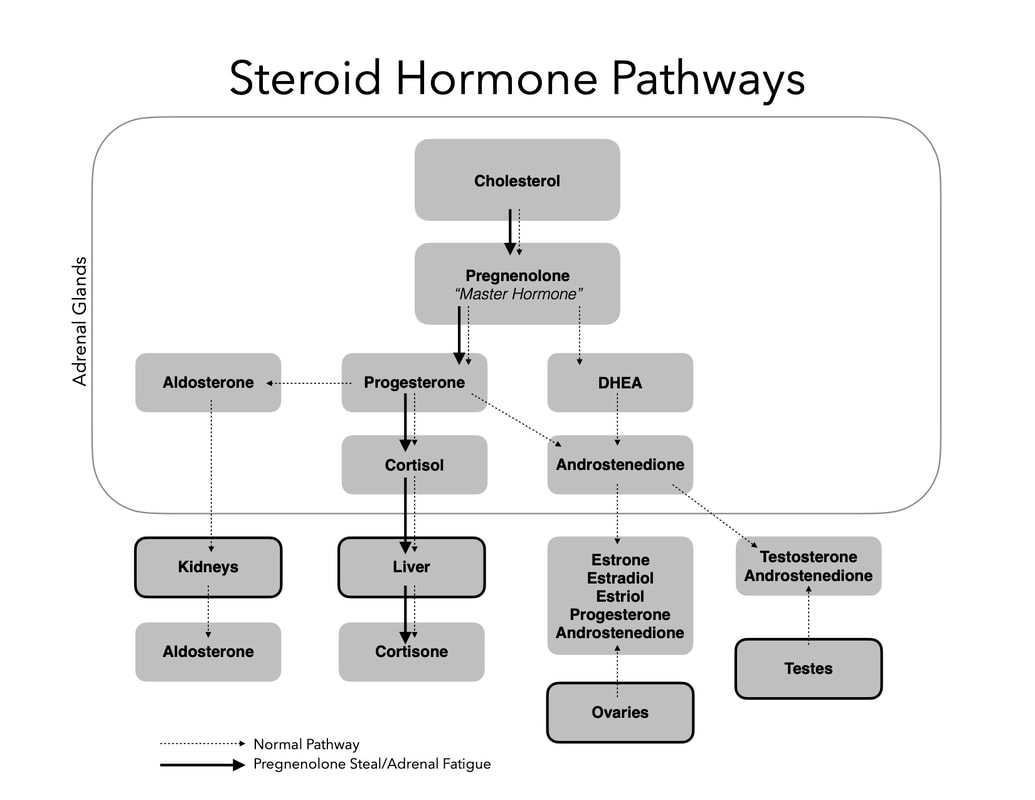|
Ok, so last week I talked all about sleep, one of the 4 biological needs of a human. The others being food, water and mating (aka- sex). This week, we’re talking about stress, which also means we’re talking about sex, because when you are too stressed out, guess what commonly happens...you lose your sex drive. I hear it ALL THE TIME from athletes. “I’m too tired." Yes, maybe. But you’re probably also releasing so much cortisol from training, working, balancing family needs, financial obligations and just life in general that your body can’t actually produce enough of the hormones that actually create a sex drive. This is a problem because it’s one of the biological requirements for human survival! Not having a sex drive should be a big fat sign that something isn’t right. So let’s talk about it…
|
| Healthy Adrenal Function Phase 1: Hyper-Cortisol This is the first sign that the body is not handling the stress load optimally. On test results, you see high levels of cortisol throughout the day. Symptoms are typically: anxiety, low immunity, restlessness and insomnia. Phase 2: Resistance Response This phase is often called the “wired and tired” phase. Here, additional hormone irregularities are seen (especially with blood sugar, electrolyte imbalances and low sex hormones) which can lead to mood and sleep issues along with frequent energy crashes. Phase 3: Hypo-Cortisol Often described as exhausted, at this phase people are typically feeling completely wiped out. Simple tasks become difficult, motivation across the board is lacking, and people are often described as being “tuned out.” Symptoms are typically: depression, chronic pain all over the body, low immunity and additional hormone imbalances. |
Supplements
It can not be emphasized enough that certain supplements can make your stress pattern worse if they are used incorrectly. If adding supplements to your daily routine to help ease mental stress and support healthy adrenal function is important to you, talk to a knowledgeable practitioner about your symptoms before starting a protocol.
With that said, some of the more common supplements used are:
LICORICE ROOT- For people who do not produce enough cortisol. It has been found to improve energy levels and help regulate cortisol levels.
CURCUMIN- a compound with antioxidant qualities found in turmeric. It has been found to enhance mood and reduce inflammation (especially in the brain). Note: Curcumin extracts are the most potent form of turmeric supplements that will give you the most curcumin compound. Concentrated extracts pack up to 95% curcumin, whereas turmeric in powder form usually contains around 3% curcuminoids.
PHOSPHATIDYLSERINE- a phospholipid found in cells that influence immune function and muscle metabolism. It has been found to help rebalance cortisol levels following exercise.
ASHWAGANDHA- an adaptogenic adrenal supplement. It has been found to improve resistance to stress along with decreasing depression and anxiety.
In Summary
In an athletes off-season, taking more down time can be critical to recovery. Pay attention to the signals your body is giving you as you take more time doing more relaxing activities (like paddleboarding, yoga, walking, etc) can help you learn where your balance point is.
One athlete may be completely fine doing 3-4 interval sessions per week, where another athlete may become completely exhausted doing that. You can learn to identify what triggers a stress response in you and how to take care of yourself physically and emotionally in the face of these stressful situations and the off-season is a perfect time to do that.
We call it recharging the battery and it’s important! So next time your body is screaming for a nap, listen. It’s okay to skip a few training sessions to allow your body to recover from life's chronic stressors. It doesn’t make you lazy...it makes you smart.
You’ll be surprised how much harder you can hit your next training session (or even your entire next season) when you learn how to find a better balance between your life’s stressors and relaxation!
Hi Rebecca. There are a few that I like. I personally use Apex Energetics Turmero Active, but I also recommend Theracurmin HP by Integrative Therapeutics, Inflama-Care by Planetary Herbals, and CurcumRX by Biotics Research.
Leave a Reply.
Author
Tiana Rockwell is a certified nutritional therapist, avid endurance athlete and dark chocolate lover. She believes that by eating REAL food, we can balance our body and reach optimal health and wellness!
Archives
May 2022
January 2022
December 2021
November 2021
October 2021
September 2021
July 2021
May 2021
April 2021
November 2020
October 2020
September 2020
August 2020
July 2020
June 2020
May 2020
April 2020
March 2020
February 2020
January 2020
December 2019
November 2019
September 2017
August 2017
May 2017
November 2016
September 2016
July 2016
December 2015
October 2015
July 2015
June 2015
Categories
All
Commit
Detox
Fat Loss
Food Prep
Goals
Macronutrients
Muscle
Planning
Post Workout
Preparation
Protein
Recipes
Resolutions
Shakes
Smoothies
Strength







 RSS Feed
RSS Feed